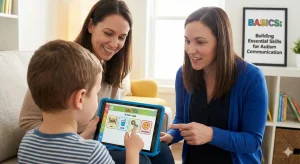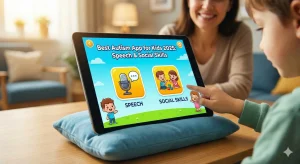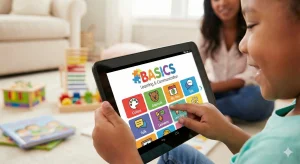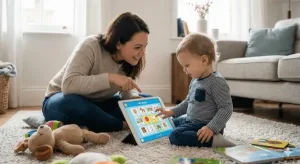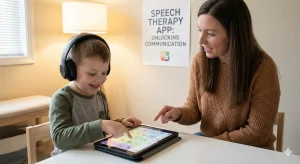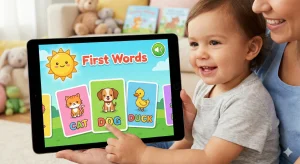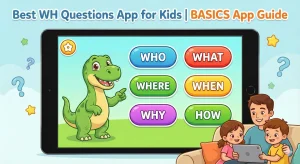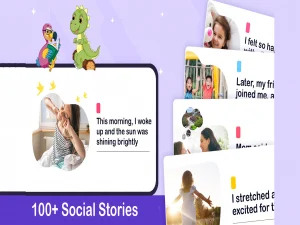Is My Toddler Avoiding Other Kids? Signs of Social Delays
By Rajini D
Last Updated: July 26, 2025
As a parent, it’s natural to wonder if your toddler is simply shy—or if something more is going on. Every child is different. Some jump into group play easily, while others take their time to warm up. But if your toddler is consistently avoiding other kids, not joining in play, or seems withdrawn in social settings, it could be a sign of a social delay.
While some quiet behavior is perfectly normal, it’s also important to recognize when a pattern may need a little more attention. Early social development plays a big role in building communication skills, emotional connection, and confidence.
In this article, we’ll help you understand:
- What typical toddler social behavior looks like
- Common signs of social delay in toddlers
- When to wait, when to support gently, and when to seek professional help
Supporting your child’s growth doesn’t mean jumping to conclusions—it means noticing changes and acting early when needed. And when you’re ready, support is available.
Free Speech Help for Kids
Concerned about speech delays? Book a free consultation with our expert speech therapist and get guidance tailored to your child’s needs.
Is It Normal for Toddlers to Avoid Other Kids?
If your toddler prefers to play alone or avoids group activities, you might be wondering: “Is it normal for toddlers to avoid other kids?” The short answer is — sometimes, yes. But it depends on what you’re seeing and how often it happens.
Many toddlers go through phases where they seem shy or prefer solo play. This is especially common in new environments or around unfamiliar faces. Some children naturally need more time to feel safe before opening up. That’s okay.
But there’s also a difference between shyness and persistent social withdrawal.
What’s Normal Social Behavior in Toddlers?
By around 18 to 24 months, most toddlers:
- Show curiosity about other kids (even if they don’t play with them yet)
- Watch what other children are doing
- Enjoy parallel play (playing next to others without much interaction)
- Start to copy actions or sounds they hear from peers
These are healthy, early signs of social interest and development.
When Should You Take a Closer Look?
While all toddlers grow at their own pace, it’s a good idea to observe if your child:
- Rarely looks at or shows interest in other children
- Avoids group settings like playgroups, even after multiple visits
- Doesn’t respond when another child talks or reaches out to play
- Becomes upset or withdrawn around other kids consistently
If these signs continue beyond age 2 or seem to affect your child’s day-to-day life, they may be showing signs of a social delay. It could be related to speech and language challenges, sensory issues, or even early signs of autism — all of which are best understood with gentle support and guidance.
Signs of Social Delay in Toddlers Parents Should Know
It’s not always easy to tell if your toddler is just shy or if something deeper is going on. But as a parent, you know your child best. Paying attention to everyday interactions can help you spot early signs of social delay in toddlers — and act early if needed.
Here are some common signs to watch for:
Toddler Doesn’t Play With Peers or Siblings
While toddlers don’t always play together in the early years, they usually show some interest in others around them. A toddler with social delays might:
- Ignore or avoid other children during playtime
- Not try to share, take turns, or join in group games
- Seem disconnected even when siblings or cousins are nearby
Avoids Eye Contact or Group Activities
Eye contact is one of the early ways children connect with others. If your toddler:
- Rarely makes eye contact during play or conversation
- Turns away or shuts down during group play or music time
- Doesn’t seem engaged during circle time or group learning activities
…it might be a signal to look more closely at their social development.
Prefers Being Alone Most of the Time
Wanting solo time isn’t always a problem—but if your child always prefers being alone and gets upset when others approach, it could be a red flag. Signs include:
- Playing in a corner or separate area during group time
- Walking away when other children come near
- Showing more comfort with objects than people
Doesn’t Respond to Others Talking or Calling Their Name
One of the earliest signs of connection is how a toddler responds to sounds, voices, or names being called. Watch out for:
- No response when their name is called
- Not turning toward a familiar voice
- Ignoring simple social cues like “hi,” “bye,” or “look at this!”
Sometimes, this could point to hearing issues, language delays, or autism-related traits.
Doesn’t Imitate or Engage in Pretend Play
Toddlers learn by copying others. Imitation and pretend play help build imagination, speech, and connection. You may notice:
- Your child rarely imitates actions like waving, clapping, or talking on a toy phone
- They don’t pretend to feed a doll, talk to toys, or mimic daily routines
- They prefer repetitive actions over playful interaction
Could It Be Autism or a Speech Delay?
If your toddler seems to avoid other kids or struggles with social interaction, it’s natural to wonder: could it be something more? Many parents ask whether these are signs of early signs of autism in toddlers, a speech delay, or just part of normal development.
The truth is — social and communication delays often show up together. That’s because speech and social skills grow side by side. If a child isn’t speaking much, they may also struggle to play with peers, respond to others, or join in group activities.
How Speech and Social Delays Are Connected
Here’s how they often overlap:
- A child with a speech delay may find it harder to connect with others, which can lead to avoiding social play.
- A child with social delays may not learn as much language because they miss out on back-and-forth interaction.
- Sometimes, both delays are early signs of autism spectrum disorder — but not always.
It’s also possible for a toddler to have speech challenges without autism, or social delays due to shyness, anxiety, or other developmental differences.
Could It Be an Early Sign of Autism?
Avoiding other children, not making eye contact, and not using gestures (like pointing or waving) are often considered early signs of autism in toddlers. Other red flags may include:
- Limited pretend play
- Repeating the same actions over and over
- Not responding to their name
- Unusual reactions to sounds, textures, or lights
But remember — every child is different, and one or two signs don’t automatically mean autism.
What Should Parents Do?
You don’t need to jump to conclusions. Instead, focus on gentle observation:
- Keep notes of behaviors you’re concerned about
- Notice patterns across different settings (home, park, daycare)
- Don’t wait if your gut tells you something feels off
Early screening can offer clarity and peace of mind.. If there is a delay, getting help early makes a big difference.
Book Free Autism Session
Concerned about your child’s development? Talk to our autism expert online for free. Get personalized consultation and expert next steps.
How to Help a Toddler Who Avoids Other Kids
If your toddler isn’t showing much interest in playing with others, don’t worry — there are small, simple things you can do at home to support their growth. Many parents search for ways to help a toddler socialize when they notice their child isn’t making friends easily.
These tips aren’t about forcing your child into uncomfortable situations. Instead, they’re gentle ways to build social confidence, one step at a time.
Try Simple Playdates With One Child at a Time
Start small. A big group can be overwhelming for toddlers who are shy or socially delayed.
- Choose a familiar setting like your home
- Invite a calm, friendly child who your toddler has seen before
- Keep the visit short (30–45 minutes is enough!)
- Allow your toddler to observe at first without pressure to interact
Over time, these low-pressure moments can help them feel safe and curious about peer play.
Use Parallel Play to Build Comfort
Not all play has to be interactive right away. Parallel play—when toddlers play side by side without engaging—helps build comfort.
- Set up toys your toddler enjoys alongside another child
- Let them do their own thing at first
- Watch for small moments of connection, like shared laughter or copying actions
This stage often leads to more direct play as social skills grow.
Model Friendly Behavior at Home
Toddlers learn a lot just by watching you. Show them what being social looks like in simple, everyday ways.
- Greet others with a wave and a smile when you’re out
- Say phrases like “Hi, let’s play!” while playing with your toddler
- Use puppets or stuffed toys to model turn-taking or sharing
Even short pretend conversations can help your toddler pick up social language.
Encourage Pretend Play With You or Siblings
Pretend play helps your child build imagination, empathy, and social awareness.
- Play “kitchen,” “doctor,” or “grocery store” games together
- Use dolls or action figures to act out simple stories
- Praise your child when they include others in their pretend world
Pretend play also boosts speech, which supports social development too.
Limit Screen Time and Increase Real Interactions
Too much screen time can get in the way of learning to connect with others.
- Replace one screen session each day with face-to-face play
- Focus on hands-on activities like blocks, books, or art
- Make mealtimes device-free and talk about your day
When to Seek Help for Toddler Social Delays
As parents, we often wonder: “Is this just a phase, or is it time to get help?”
Knowing when to worry about toddler social skills can feel overwhelming — but the good news is, you don’t have to figure it out alone.
If your child is avoiding other kids now and then, that might be totally normal. But if the behaviors continue for several weeks or months and start to impact daily life, it could be time to check in with a professional.
Red Flags That May Need Support
Here are some signs that may suggest it’s time to seek help:
- Your toddler rarely makes eye contact or avoids looking at faces
- They don’t respond when their name is called or when others try to engage
- They don’t show interest in other children — even after repeated exposure
- Your child has limited gestures (like pointing, waving, or showing objects)
- They seem more connected to objects than people, or engage in repetitive behaviors
- They struggle with both speech and social interaction
If you’re seeing a few of these signs consistently, trust your instincts. You don’t need to wait for things to “get worse” before asking for help.
Why Early Action Matters
The earlier we support a toddler’s social development, the better the outcomes.
With the right tools, many toddlers catch up beautifully and become more confident in social settings.
Getting help early:
- Builds stronger communication skills
- Makes transitions (like preschool) easier
- Reduces long-term struggles with behavior and learning
- Helps you feel more confident as a parent
You’re Not Alone — Support is Available
Every child is unique, and needing a little extra support doesn’t mean something is “wrong.”
It just means they may need a different pace or approach — and you’re doing the right thing by paying attention.
At Wellness Hub, we offer early screening, playful therapy sessions, and goal-based support to gently guide your toddler toward better social and communication skills.
Conclusion
If your toddler is avoiding other kids, don’t ignore the signs. You’re not alone — many parents notice the same things and feel unsure. Early support can help your child connect better, talk more, and grow socially. With the right help, even small steps lead to big changes. That’s why early intervention for toddlers matters. You don’t have to wait and see.
Frequently Asked Questions:
1. Is it normal for toddlers to avoid other kids?
Some toddlers are naturally shy or take longer to feel comfortable around others. If your child avoids kids sometimes — like in new places or around unfamiliar faces — that’s often okay. But if your toddler never shows interest in other children, doesn’t try to join in play, or seems upset around peers most of the time, it could be a sign of social delay. In that case, it’s a good idea to gently monitor and seek advice early.
2. What are the early signs of social delay in toddlers?
There are a few signs that may point to a social delay:
- Your toddler plays alone all the time and doesn’t look at or approach other kids.
- They don’t show interest in what others are doing.
- They avoid eye contact or group activities.
- They don’t copy gestures like clapping, waving, or pointing.
- Your child rarely smiles back or responds to social cues like “hi” or “bye.”
If you notice several of these signs, your toddler may benefit from early support.
3. Can speech delay affect my toddler’s social skills?
Yes. Speech and social skills are closely connected. A toddler with a speech delay might:
- Find it hard to express themselves
- Avoid other kids because they can’t keep up in conversation
- Feel frustrated during playtime
This may lead to fewer chances to practice social skills. That’s why it’s important to support both speech and social development together.
4. Could my toddler avoiding others be a sign of autism?
It could be, but it’s not always the case. Some toddlers who avoid eye contact, don’t play with peers, or don’t respond to their name might be showing early signs of autism. Other signs may include:
- Repetitive behaviors
- Strong reactions to sounds or lights
- Limited pretend play
However, many children show one or two of these signs without having autism. A gentle developmental check can help you understand what’s going on.
5. When should I worry about my toddler’s social development?
You might want to seek support if your toddler:
- Doesn’t look at, respond to, or play near other children
- Avoids all group settings like daycare or playgroups
- Doesn’t use gestures or imitate others
- Shows no interest in playing with toys or pretending
If these behaviors continue for several weeks or seem to get worse, it’s okay to ask for help. Early action is always better than waiting and wondering.
6. How can I help my toddler make friends?
Here are a few simple things you can do:
- Set up short playdates with just one other child at a time.
- Encourage parallel play where kids play side by side without pressure.
- Use pretend play at home (like dolls or kitchen sets) to teach social skills.
- Show friendly behavior — say “hi” to people in front of your child, share toys, and model kindness.
- Praise small efforts, like smiling at another child or sitting nearby.
These steps help build confidence and teach your toddler how to connect with others in their own time.
7. What age should a toddler start socializing with others?
Most toddlers start noticing other children by 18 to 24 months. At first, they may play next to other kids instead of directly with them (this is called parallel play). Around age 2.5 to 3, children usually begin interacting more — sharing toys, copying actions, and playing together. If your toddler is well past 2 and still shows no interest in other children, it may be time to look deeper.
8. Should I reduce screen time if my toddler avoids social play?
Yes. Screens can keep your toddler busy, but they don’t help build real-life social and communication skills. Too much screen time can limit face-to-face interaction, which is how toddlers learn to talk, share, and connect. Try:
- Replacing one screen session a day with play or reading
- Encouraging hands-on toys like blocks or puzzles
- Spending time talking and playing with your toddler daily
Less screen time usually means more chances to practice social development.
9. Can social delays improve with support?
Absolutely. Many toddlers with social delays show great progress when they get the right support early on. With early intervention, children can:
- Improve eye contact and interaction
- Learn how to join in play and respond to others
- Build both speech and social confidence
Every child learns at their own pace, but early help can make the journey smoother and more successful.
10. Where can I find help for my toddler’s social or speech delay?
You can talk to a pediatrician, child psychologist, or speech-language therapist. If you’re not sure where to start, Wellness Hub offers early screening tools, online therapy, and personalized programs to help toddlers with speech and social delays. Support is just a click away — and it’s designed with your child’s happiness in mind.
About the Author:
Rajini Darugupally
M.Sc., Speech-Language Pathologist (9+ years of experience)
Rajini is a passionate and dedicated Speech-Language Pathologist with over 9+ years of experience, specializing in both developmental speech and language disorders in children and rehabilitation in adults. Driven by a desire to empower each individual to find their voice, Rajini brings a wealth of experience and a warm, genuine approach to therapy. Currently, at Wellness Hub, she thrives in a team environment that values innovation, compassion, and achieving results for their clients.
Book your Free Consultation Today
Parent/Caregiver Info:
Client’s Details:
* Error Message

